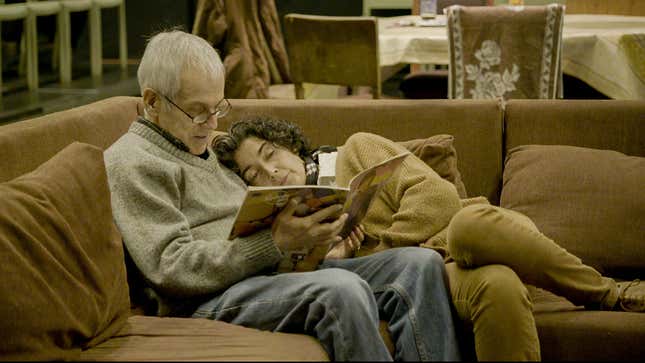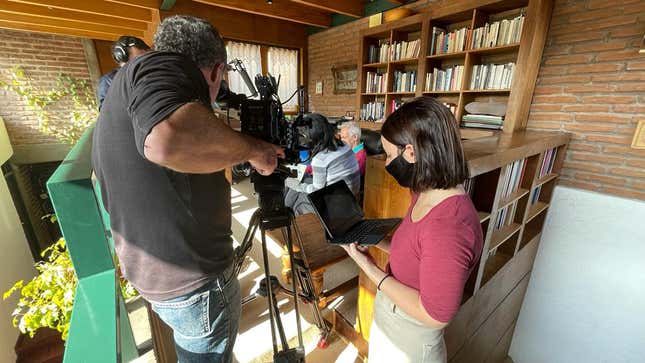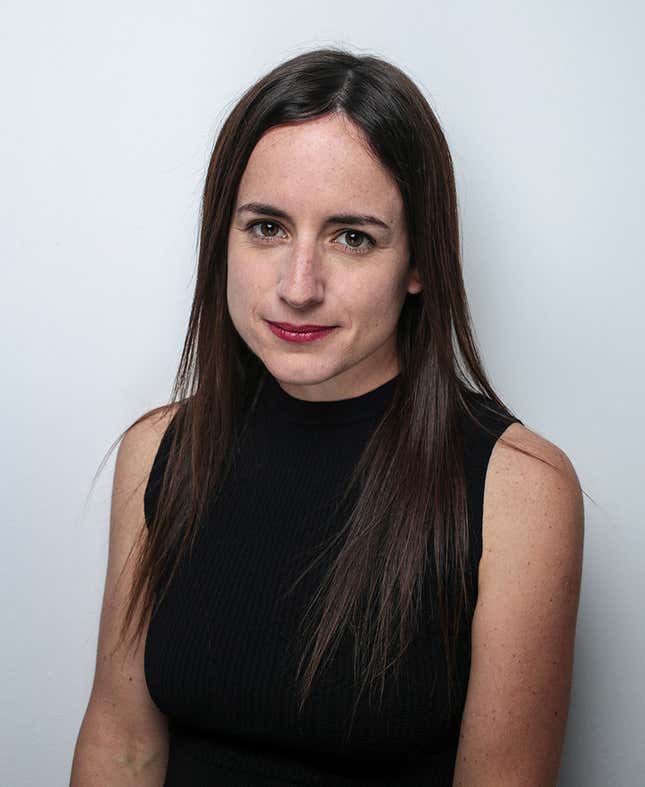
Well into the documentary The Eternal Memory, a bitter irony sets in. As a journalist, Augusto Góngora fought for the preservation of national memory in his native Chile, and yet his own memory is dwindling away. During the oppressive Pinochet dictatorship, Góngora had edited a newspaper for the opposition and reported on crimes of the Pinochet regime on underground television. He then co-wrote Chile: The Forbidden Memory, which detailed the regime’s extensive human rights violations. In a note written to his wife Paulina Urrutia, actor and former minister of the National Council of Culture and the Arts, and read in the movie, Góngora said: “Memory is forbidden but this book is stubborn.”
When we meet Góngora in Chilean director Maite Alberdi’s documentary, those days of journalism are long behind him. He is effectively retired and in a state of cognitive decline from Alzheimer’s disease, tended to by a loyal and preternaturally patient Urrutia. Cutting back and forth in time, The Eternal Memory, which opened last week in New York and today in Los Angeles, portrays the domestic life of the couple, rounding it out with dispatches from their past, often via professional video footage and home movies. It is largely devastating, but it’s often shocking when it’s not—particularly early on, when Góngora and Urrutia sometimes smile and laugh about Góngora’s lapses. But as the documentary, which was shot over the course of nearly five years and wrapped in August 2022, progresses, the situation becomes more fraught. Góngora is increasingly agitated by his own flashbacks to the days of the Pinochet regime. Urrutia’s patience, meanwhile, remains unwavering.
The Eternal Memory played Sundance this year, where it won the World Cinema Grand Jury Prize: Documentary. Góngora died in May, less than a year after Alberdi wrapped shooting. Jezebel talked to the director about the intimate project and Góngora’s legacy. An edited and condensed transcript of our discussion is below.
JEZEBEL: I read in the press notes that you followed Augusto and Paulina for about four years.
MAITE ALBERDI: Almost five.
That’s a long time to be filming a documentary, right?
I usually shoot for five years. I am used to following people for a while.
Why that much time?
Because reality takes time to develop. People and life do not change in one month. To see process and to see narrative and dimension of time, you need to be following for a while. And in this case, I always said at the beginning I wanted to be with them until the end, and if the end was 10 years, I was going to be there 10 years.
How did you know what the end was when you got there?
It’s a good question, because it was an abstract idea: What is the end? In this case it was not when Augusto passed away, of course, it was one of the last scenes of the film when he was walking with [Paulina] and he said, “I’m not anymore.” And she said to him, “You are.” And he said, “No, I’m not.” What he was saying at that point was like, “I am not the one that I used to be.” It was the first time in five years that I felt uncomfortable shooting him. I was very clear that moment was the end.
Augusto’s sense of awareness throughout the movie seems to waver. Was there any question you had about his ability to consent to participate in this?
Yeah, it was very important. I usually work with old people, and I worked before with people with dementia. In this case, we started when he was very conscious, and he was very clear that he wanted to make the film. Despite his wife, his son and daughter [from a previous relationship], and everyone who agreed, it was very important for me that he agreed. He was the one that convinced Paulina to do the film. Paulina said that the film probably was his biggest act of consequence, because it was his decision to do it and to register it as his last estate.
So they were both on board from the start, but was it always smooth sailing? Did either of them express apprehension as you were filming?
No, as in all relationships, you build the limits and you build what you’re doing together. And in this case, as it was five years, it took time. It was slow. I think it was very organic for the three of us to see what situations we were going shoot. And when the pandemic arrived, the lockdown was very long, so they shot a big part of the film [themselves]. I think that the most intimate moments of the film were shot by Paulina.
[The pandemic was] a big obstruction for me because I could not go. But at the end it was a gift, because even if I had all the access, the level of intimacy of it there...like during the first scene: It’s 2 a.m. I would never be there even if I had all the access, and it’s only material that they could do by themselves.

It seems like it’s a conscious choice that Alzheimer’s isn’t mentioned directly until well into the movie. Can you explain that?
It’s a conscious choice because it’s a film about a couple. It’s not a film about a disease. So we didn’t have to put the context from the beginning. And I think that you completely understand the situation: The film starts with a husband that does not remember who he is. It’s clear in a way.
Did you go into it knowing that you’d have these intertwining themes of Augusto’s work being so much about the preservation of memory and what it means for identity, versus his own deteriorating memory? Or did that irony develop as you were filming?
No, it completely developed when I was filming. At the beginning I wanted to make a film only about the love story. And during the love story, he sent me the signs to understand that path was really important, because he always remembered certain things in the middle of his Alzheimer’s. That body remembered the pain of dictatorship. He remembered his work. He remembered the friend that he lost. So he started to make that connection with the past. For example, when I found the dedication that he made in the book to Paulina about memory, it was like, of course. So I started to take that line because he has an eternal remembrance, I think.
I mean, what a thing to encounter as you’re making this movie, just thematically. It all sings.
It was surprising for me to understand the metaphor, like how there are things that the body always feels. Augusto forgot numbers. Like Paulina said to him, “How many years have we been together?” And he didn’t know really, but he knew “our house,” and, “We didn’t have children because you didn’t want that.” Things that were completely important in the relationship, he remembered. It’s the same as he said in the opening of his book: We have to make our mornings and remember always our emotions of what we felt in the coup and in the dictatorship.
Once you wrapped in August of 2022, how much did you keep in touch with him and Paulina?
A lot. Like, constantly. When you finish a film, it’s weird because you cut the day-to-day, but you don’t cut a relationship. You construct and you build a relationship with the characters. It’s a friendship that you continue in.
Did Augusto get to see the movie before he died?
No, because he was completely different from how you see him at the end of the film, versus how he lost his last months. He was completely lost. It would have made no sense for us to show it to him.
What did Paulina think of the movie?
I am doing Q&As with her, and yesterday she said the movie is a gift for the audience and for herself because Augusto is alive. And she said that only after seeing the film, she understood why Augusto was so obsessed and that he was right.

And how is she doing in light of this death?
It’s difficult because she lost her love, she lost her routine, she lost a life. So she’s living day by day. And I think that the film helps her mourning because it’s a good excuse to speak about him all the time. The Q&As have been very important for her.
Just as a viewer, I got the sense it gave the movie more urgency when you understand that the subject’s health is declining, just for the posterity of it all.
Yeah, completely. And that was our energy and our desire when we started making the film. It was like, “Okay, we have to make this.” We didn’t have funds. We started with a gut feeling.
I think part of what makes this film so moving is, like you said, that it’s not just about Alzheimer’s. It’s a movie about care. And on top of that, memory itself is kind of a fraught concept, right? I mean, very few of us can rely on our memory verbatim. So I feel like what you just talked about—that alone makes the movie relevant beyond the nuts and bolts of the condition and the situation.
I think for me, it’s not a film about Alzheimer’s. It’s a film about a relationship in general and a love story and how the lovers commit with the past. Paulina always said a very good phrase that I love: “The only way to evolve as a society is for everyone to take care of another human being at one point of our life.” At the end it’s about taking care.